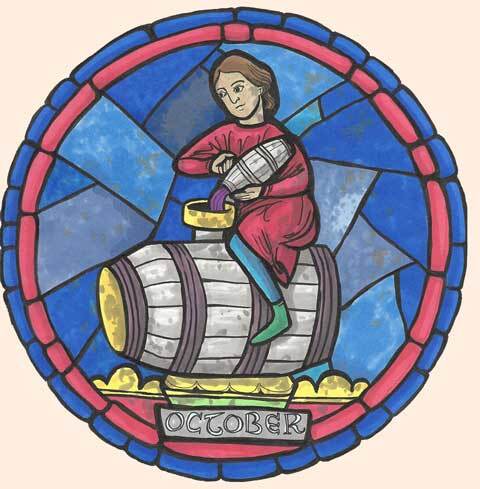
October
Farming the Emotional Function
The making of wine out of grapes represents the most radical transformation in our annual cycle. The end result is so different from the original raw material that we might never guess the complex and pleasing liquid we sip was once a cluster of sour grapes. Our aim with inner farming is likewise radical: not a slight change or minor alteration of our character, not even successfully eliminating one habit or another, but a fundamental transformation of whom we call ‘I’. This requires many conditions, some internal, others external, and the single most valuable external agent that can facilitate this transformation is suffering.
By nature, our Essence cannot tolerate suffering. As children in Essence, we sob and bawl at the slightest disappointment. If we are denied what we want, or if appeasing our hunger is slightly delayed, or at the prospect of the smallest discomfort, we give immediate and unrestrained expression to our sorrow. We are yet to acquire the understanding that life cannot cater to our every need and desire, especially at the very moment we want it. Rubbing up against the demands and expectations of life will sooner or later teach us this, but the Personality we will form as a result only appears to place us in a better position to handle suffering. We still give expression to our every disappointment, except that now we do it in a more sophisticated and socially acceptable way. We manifest our displeasure through the expression of negative emotions.
Negative emotions encompass the entire range of anger, irritation, frustration, jealousy, fear, apprehension, self-blame, brooding, and the like. The challenge of identification mentioned in September is most forcefully expressed in the tempting manifestation of these feelings. In other words, they come with the strongest sense of ‘I’. They seem genuine and their expression seems justified because they seem to arise as a natural response to the suffering inflicted upon us. I am insulted by someone, so I feel justified in expressing my anger or hurt. I had hoped for something that doesn’t come to pass, so I feel justified in expressing my disappointment. I had made an effort on someone else’s behalf without being thanked, so I feel justified in protesting this injustice. While these examples might indeed occur, careful observation will reveal that they only account for a fraction of the stimuli for the expression of our negativity. The overwhelming majority of our negative emotions do not actually represent reactions to any real external loss or misfortune; they are stimulated by our imagination: a chronic sense of feeling inadequate, fear of imaginary catastrophes, boredom over doing pointless tasks, disbelief that our efforts will bear fruit, concern over world events, etc. Until these misfortunes actually happen, our mind tortures us with the illusion they already have, stimulating the expression of negativity. As a consequence, we default to living in an almost permanent state of negativity, regardless of whether it is triggered by an illusion or a legitimate stimulus .
That our internal state would default to negativity does not make sense, unless this serves an ulterior motive. In reality, the unwarranted indulgence in negative emotions follows the same pattern of indiscriminate waste discussed in March and is by far our greatest leak. Until we plug its expression, we cannot access the higher registers of our emotional function. Therefore, October invites us to observe the habitual negative emotions particular to ourselves and sever our identification with them. Here, moving from theory to practice will prove surprisingly difficult. Anger and complaint flare up so quickly, brooding and self-pity manifest so subtly, that by the time we realize they have been draining our finest energy, much of it has already gone to waste. To stand a chance at timely non-expression, we must catch our negativity in real time, and the best way of doing this is by eliciting it voluntarily.
Place yourself in a situation that reliably stimulates negativity. Call a person who regularly annoys you, or engage in conversation with a colleague you habitually avoid, or chat with the store assistant who seems unfriendly and not worth your attention. The aim is to bring about an interaction you habitually perform in identification and reenact it consciously. Placing yourself voluntarily in such a situation changes your relation to the resulting friction. You are no longer a victim, you are actively taking responsibility for your part in the interaction, which punctures the justification behind your displeasure, enabling you to more readily resist its expression.
Proper practice of this effort creates a remarkably energetic internal environment. Our inner landscape is split in two: the reactive part and the part that observes. It is a delicate balance and the inexperienced practitioner will doubtlessly fall to one or another side of this tightrope: on one side, the awareness of having willingly placed ourselves in an awkward situation, and on the other side, dwelling on the self-torturing aspect of this effort. Throughout, we must bear in mind that voluntary suffering is only a means to create this powerful separation. It proves our negativity is an ongoing waste of energy that latches onto any external excuse. It confirms how this energy, redirected, can transform our sense of ‘I’ from the habitual emotions we experience into something altogether different. All we need is one moment of successful transformation to verify the profound potential of the non-expression of negativity. No other internal effort can so clearly outline our observer as distinct from what we observe, the real in us as distinct from the artificial.
The return to Essence, as we discover, is not a matter of seeking inner peace. This is one of the biggest oversights of contemporary spirituality. It hinges on our ability to contain pressure without leaking it through the habitual vents of negativity. The consequent internal environment generates emotions of a completely different order than those we are used to, a yield that cannot appear by accident for the same reason that grapes cannot accidentally turn into wine. The non-expression of negativity disarms Personality and forces Essence to grow up. We return, not to the sobbing and bawling child we used to be, but to an altogether new being pregnant with immense potential. Let it grow enough—let the effort of transformation persist long enough—and Essence regains its rightful place in our internal landscape: the status of Master.

September
The Emotional Function as Given by Nature

November
Time
